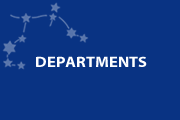- HOME
- DEPARTMENTS
- Faculty of Life Sciences
Faculty of Life Sciences

Applying the Life Sciences to Society from a Social Science Viewpoint
Although the life sciences can take a lot of credit for creating healthy, abundant societies though its application, for example, in drug discovery and therapy, so too are the life sciences responsible for producing societal problems related to the dignity of life and ethics. In addition to foundational natural science research based on education that draws from cutting-edge research, the Faculty of Life Sciences also approaches issues related to life using the power of the social sciences. Under the novel banner of “life sciences that connect to society,” the faculty cultivates human resources that understand the intersections between the life sciences and society and aim to actively identify and solve problems that can be communicated to others.
Learning Highlights
Connecting the Life Sciences and Society: Two Departments with Different Perspectives
To make the evolving life sciences contribute to the creation of an abundant society, the faculty’s departments cover both foundational natural science research, as well as the application of the life sciences via the social sciences. Incorporating a social science perspective into the study of the natural sciences, these departments connect the life sciences to people’s daily lives. The faculty consists of two departments: The Department of Frontier Life Sciences in which graduate students deepen their understanding of foundational research in accordance with their individual career plans, as well as the Department of Industrial Life Sciences in which foundational research is applied to society from a social science perspective. This makes it possible for students to engage in learning that has a wide breadth of knowledge.
Studying Three Life Science Domains Closely Connected to Society and Daily Life
Just as life forms on this earth are connected and influence each other, students of the faculty do not study the life sciences by focusing on just one field. Rather, they delve into specialized fields after having understood the life sciences as a whole. The faculty features three domains that cover society and people’s lives: medicine and health, food and resources, and ecology and the environment.
Learning and Research Support by Teachers Engaged in Cutting-Edge Life Sciences Research
The faculty has teachers who can boast of rich research track records in a variety of life science fields, and who continue to be active on their respective research front lines. These teachers provide each student with individualized and thorough support. A rich learning and research environment are in place in which students can actively engage in learning in specialized fields through small-group instruction that is the top in its class, even for private universities.
Department Information
Department of Frontier Life Sciences: Life Medical Sciences Course, Food and Resource Sciences Course, and Environmental and Ecological Sciences Course
Deepening Expertise and Engaging in Learning on the Cutting-Edge of the Life Sciences
This department is for students who are interested in research and technical professions, and/or wish to proceed onto graduate school. Experimental subjects begin in the fall semester of students’ first year. While studying specialized life sciences knowledge in a step-by-step fashion, students perfect their specialized skills and perspectives. From the fall semester of their third year, students begin engaging in research while using advanced research facilities and receiving detailed guidance from their instructors. In addition to its life medicine sciences course, food resource sciences course, and environmental and ecological sciences course, the department also offers sub-courses for students who are thinking about becoming animal experiment technicians, food hygiene managers, teachers, or working on the international stage.
Department of Industrial Life Sciences: Medicine and Health Course, Food and Agriculture Course, Environment and Society Course
Cultivating Problem-Solving Abilities with the Life and Social Sciences
This department cultivates quality human resources that can understand the life science research findings that support contemporary society and can be active in a variety of areas of their respective industries. From the first year, students take subjects that cover both the life sciences as well as the social sciences (economics, management), and become aware of the intersections between the life sciences and society. From the fall semester of their third year, students engage in a life science internship and special research with topic-based research activities that make use of the social sciences. In addition to the medicine and health course, food and agriculture course, and environment and society course, students can also build their careers in specific sub-courses created for individuals looking to be globally active or wanting to work as educators.






